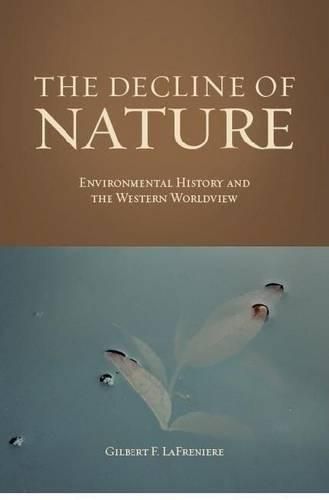Readings Newsletter
Become a Readings Member to make your shopping experience even easier.
Sign in or sign up for free!
You’re not far away from qualifying for FREE standard shipping within Australia
You’ve qualified for FREE standard shipping within Australia
The cart is loading…






The Decline of Nature is an environmental history of ideas embedded in a compact account of Western civilization’s ecological impact upon the planet, particularly in Europe and its colonies. The major thesis presented is the idea that two speculative philosophies of history (attempts to understand the meaning of history) and their associated world views have been largely responsible for destructive attitudes and behaviors towards nature. They include the idea of providence (i.e. the Christian world view) and the idea of progress (the science and technology-based vision of unrestrained economic development and material accumulation since the 17th century). Some scholars understand the idea of progress as a secularization of the Christian millennium, the creation of a new Eden through science and technology. A third, alternative philosophy of history, the idea of history as multiple cycles of civilizations rising, flourishing, and declining, was popular in both classical Greco-Roman and ancient Asian civilizations, but was rejected by Western civilization until its revival during the Renaissance and in 19th and 20th century. Oswald Spengler’s Decline of the West was the founding work of cyclical philosophy of history in the 20th century. Spengler, Arnold Toynbee, and other 20th century speculative philosophers of history have been criticized by postmodern philosophers for creating logically indefensible ‘grand narratives’. However, Spengler’s mysterious cycles of civilization have found at least a partial scientific explanation in the new discipline of environmental history. Environmental degradation played a major role in the decline of ancient Mesopotamian, Greco-Roman, Mayan and Asian civilizations. Spengler was also perceptive in distinguishing the nature-destroying tendencies of humanity in general, and Western (Faustian) civilization in particular. This monograph reflects on the position of global societies facing environmental, social and economic destruction and the historical processes that have resulted in this crisis of both man and nature.
$9.00 standard shipping within Australia
FREE standard shipping within Australia for orders over $100.00
Express & International shipping calculated at checkout
The Decline of Nature is an environmental history of ideas embedded in a compact account of Western civilization’s ecological impact upon the planet, particularly in Europe and its colonies. The major thesis presented is the idea that two speculative philosophies of history (attempts to understand the meaning of history) and their associated world views have been largely responsible for destructive attitudes and behaviors towards nature. They include the idea of providence (i.e. the Christian world view) and the idea of progress (the science and technology-based vision of unrestrained economic development and material accumulation since the 17th century). Some scholars understand the idea of progress as a secularization of the Christian millennium, the creation of a new Eden through science and technology. A third, alternative philosophy of history, the idea of history as multiple cycles of civilizations rising, flourishing, and declining, was popular in both classical Greco-Roman and ancient Asian civilizations, but was rejected by Western civilization until its revival during the Renaissance and in 19th and 20th century. Oswald Spengler’s Decline of the West was the founding work of cyclical philosophy of history in the 20th century. Spengler, Arnold Toynbee, and other 20th century speculative philosophers of history have been criticized by postmodern philosophers for creating logically indefensible ‘grand narratives’. However, Spengler’s mysterious cycles of civilization have found at least a partial scientific explanation in the new discipline of environmental history. Environmental degradation played a major role in the decline of ancient Mesopotamian, Greco-Roman, Mayan and Asian civilizations. Spengler was also perceptive in distinguishing the nature-destroying tendencies of humanity in general, and Western (Faustian) civilization in particular. This monograph reflects on the position of global societies facing environmental, social and economic destruction and the historical processes that have resulted in this crisis of both man and nature.